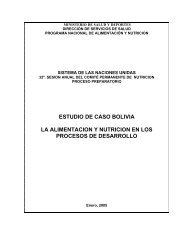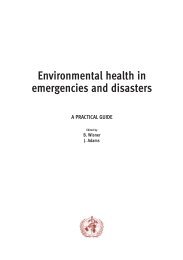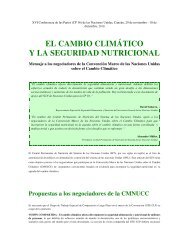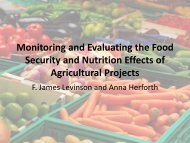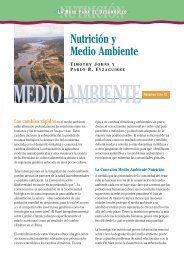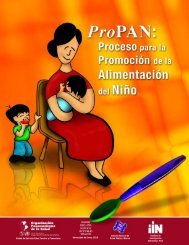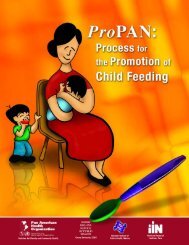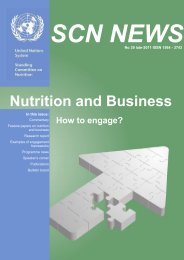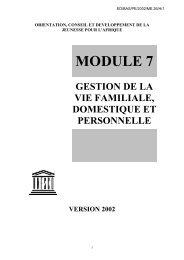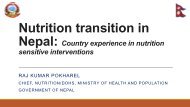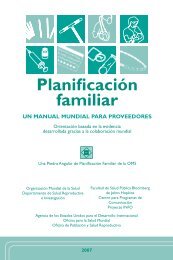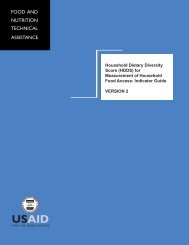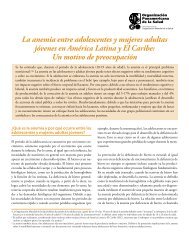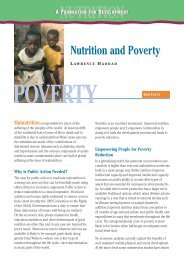SCN News No 36 - UNSCN
SCN News No 36 - UNSCN
SCN News No 36 - UNSCN
You also want an ePaper? Increase the reach of your titles
YUMPU automatically turns print PDFs into web optimized ePapers that Google loves.
www.unsystem.org/scn PROGRAMME NEWS 67<br />
of anaemia among adult women is 63 percent, while 17 percent are underweight (BMI 25). Infant mortality stood in 2004/5 at 61/1.000 live births and maternal mortality at 377/100.000.<br />
The Policy and Programme have been formulated within the context of the national poverty reduction strategy * and<br />
together with this Strategy provide a broad and inclusive policy framework aimed at reducing food insecurity and<br />
malnutrition in Zanzibar. The Policy clearly states that Government is committed to realizing the right to adequate food<br />
for all Zanzibari. Focusing on increasing in sustainable ways food availability and equitable access to safe and nutritious<br />
food for all, the Policy and Programme envisage the implementation of integrated and well-coordinated multi-sector<br />
measures at all levels of Government, directly involving civil society and the private sector. The Policy and Programme<br />
aim for existing sector policies and budgets to focus on food security and nutrition issues, and to maximize inter-sector<br />
synergies to effectively strengthen and protect food security and nutrition in Zanzibar. Efforts are currently underway to<br />
strengthen planning capacity at district level to mainstream food security and nutrition in harmony with the Policy and<br />
Programme.<br />
* Zanzibar Strategy for Growth and Reduction of Poverty 2007 - 2012<br />
Ministry of Agriculture, Livestock and the Environment, Zanzibar, United Republic of Tanzania, Contact: kilimo@zanlink.com<br />
Office of the FAO Representative, Dar es Salaam, United Republic of Tanzania, Contact: fao-tz@fao.org<br />
Prevention more effective than treatment IFPRI<br />
When it comes to child malnutrition, early intervention is crucial. Two studies conducted by IFPRI researchers and<br />
published in the leading medical journal The Lancet have made clear that preventing malnutrition is much more effective<br />
than treating it and that action must be taken in the first two years of a child's life to avoid lifelong repercussions.<br />
The first study, conducted in Haiti, found that the rates of child stunting, underweight, and wasting were lower among<br />
poor communities participating in programs to prevent malnutrition rather than treat it. "Malnutrition must be addressed<br />
in the first two years of life, the crucial period for a child's physical and cognitive development," said Marie Ruel, lead<br />
author of The Lancet article and director of IFPRI's Food Consumption and Nutrition Division. "If nutrition programs wait<br />
until children have already become malnourished, their benefits are significantly diminished."<br />
The study—conducted by IFPRI and Cornell University in conjunction with World Vision-Haiti and the U.S. Agency for<br />
International Development—indicated that it is essential for food-assisted maternal and child health and nutrition<br />
programs to proactively target all children under the age of two in poor communities. "Common sense tells us that<br />
preventing malnutrition is better than treating it, especially because children can suffer irreparable harm if<br />
undernourished during the first two years of life," said Ruel.<br />
The harm is not only physical, but economic as well. By analyzing the significant economic benefits accruing to<br />
Guatemalan adults who received adequate nourishment as children, the second IFPRI-led study published in The<br />
Lancet highlights some of the lifelong, negative impacts on those who did not. It, too, stresses the importance of action<br />
during the first two years of a child's life. Specifically, the study found that boys who received a nutritional supplement in<br />
the first two years of life earned on average 46 percent higher wages as adults, while boys who received it in their first<br />
three years earned 37 percent higher wages on average. Those who first received the supplement after age three did<br />
not gain any economic benefits as adults.<br />
This study is the first to present direct evidence of the effects of early childhood nutrition programs on adult economic<br />
productivity and incomes. The research was conducted in Guatemala by IFPRI, Emory University, the Institute of<br />
Nutrition of Central America and Panama, the University of Pennsylvania, and Middlebury College.<br />
To download from IFPRI website go to http://www.ifpri.org/PUBS/newsletters/IFPRIForum/200803/if21prevent.asp<br />
Contact N.Aberman@cgiar.org<br />
Partnership for improving HIV/AIDS and Nutrition Programming<br />
IFPRI<br />
Despite increased activity and attention to food and nutrition security interventions integrated into AIDS care and<br />
treatment programs, such interventions remain in their infancy. They tend to be ad-hoc, small scale, with limited<br />
capability to function across sectors, and poorly monitored. As a consequence, there is a lack of information about<br />
specific factors which influence their delivery and uptake by clients, and little robust evidence regarding the impact of<br />
these efforts and the ability of these boutique interventions to scale-up.<br />
The Regional Network on AIDS, Livelihoods and Food Security (RENEWAL) facilitated by the International Food Policy<br />
research Institute (IFPRI), The AIDS Support Organization (TASO) in Uganda, and Concern Worldwide have initiated<br />
two operational research studies in Uganda and Zambia to explicitly fill this information gap. Their main purpose is to<br />
systematically collect information along the flow of program implementation, monitoring and evaluation process to<br />
ultimately improve program processes, develop key monitoring and evaluation indicators, and identify key conditions for<br />
impact and for scaling-up such programs. The preliminary results are expected by <strong>No</strong>vember 2008.<br />
Website: www.ifpri.org/renewal Contact N.Aberman@cgiar.org<br />
back to contents <strong>SCN</strong> NEWS # <strong>36</strong>



